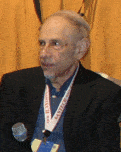He wrote the book…
Paul Weissler’s name is ubiquitous within MACS. He’s our senior technical correspondent and has been for the 35 years the Society has existed. His byline appears in literally hundreds of issues of MACS Service Reports, in the pages of ACTION™, and he’s helped host a number of tech forums at MACS’ annual training events.
I know his creds also extend well beyond MACS, encompassing major titles and players within the industry such as MOTOR and SAE International, as well as consumer-oriented pubs you might pick up at your local Barnes & Noble.

Some of Paul’s other titles include: What to Do When Your Car Won’t Run, How to Buy Services and Parts for Your Car, Women’s Guide to Fixing the Car and Auto Repairs You Can Make.
Still, I couldn’t help being a little impressed when our tech editor, Steve Schaeber, dropped one of Paul’s first published books on my desk. It was Small Gas Engines: How to Repair and Maintain Them published in 1975 by the Book Division of Times Mirror Magazines, Inc.
That got me interested in exploring further. A few searches at Amazon.com turned up a whole list of Paul Weissler titles, probably at least 10 before I stopped looking (even Paul had forgotten some when I later asked him about them).
However, he did recall writing Automotive Air Conditioning, published in 1981 by Reston Publishing Company, Inc. “It may have been the first time R-134a was mentioned in a book,” Paul noted. In fact, he did write about R-134a 15 years before that refrigerant became the accepted industry norm.
Of course, R-134a wasn’t a sure thing when Paul wrote about it in the late ‘70s, early ‘80s, witness this excerpt from the book: “Also under development is a refrigerant, R-134a that does not contain the ingredient in Refrigerant 12 that is considered possibly harmful to the atmosphere. At present, however, Refrigerant 134a is not a suitable carrier for refrigerant oils, so it may pose compressor lubrication problems. Also, although it has been made in the laboratory, there is no presently known way to mass produce it economically.”
Incredible changes have reshaped the industry since Paul first began writing about it. But arguably, no one has tracked those changes more carefully, nor chronicled them more effectively for service technicians, as has Paul.
So if you ever consider calling him out on some technical point, just remember – he wrote the book (several books, in fact).
